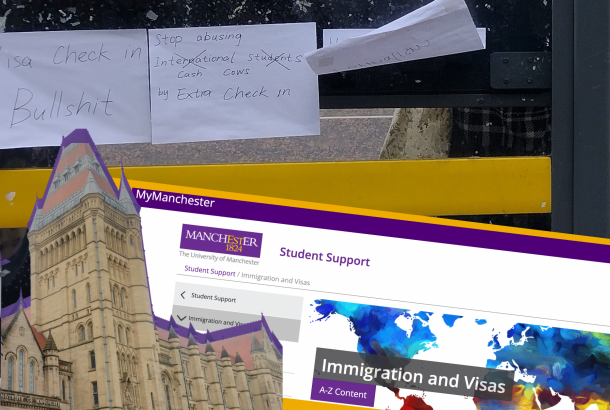A new normal? How societies are coping with Covid
By Aimee Butler

The University of Manchester is known for its vast array of societies. From quidditch to creative writing, dodgeball to anime, aerial arts to 90s hip hop, there is something for everyone. Societies are a key way to meet people, particularly for first years, but the coronavirus pandemic has significantly impacted the running of these organisations, with no in-person meetings or training able to take place.
The Mancunion spoke to leaders of societies at both the University of Manchester and Manchester Metropolitan University, to take a look behind the scenes and shed light on how much work and effort is being put in to ensure these clubs remain active for years to come.
For some societies, such as UoM’s Film Society, the pandemic has had a positive impact, encouraging people to make the most of their situations, reporting an increase of 500 members so far this year. Daisy Whalley, committee member at UoM’s Film Society, stated that “current circumstances have made societies more significant than ever,” and a space where members could share a love of film is “particularly popular with students who feel lonely and isolated in lockdown”.
The film society was able to switch from face-to-face to online meetings with ease, allowing them to continue to run meetings, which help students make friends with similar interests and have a break from the challenges of university life.
Other societies have been able to adapt well to the new online landscape. Quick-fire family fortunes, online chat nights, musical bingo and a hugely successful Kahoot! League are among some of the engaging activities organised by Connor Birch, and the UoM Geology and Environment for Manchester Students (GEMS) Society.
The MMU Canoe Society and the UoM Model UN Society also found that the pandemic, provoking a move to an all-online format, allowed them to expand the society and form connections between other local universities, as well as useful contacts across the pond. The MMU Canoe Society’s links with the University of Salford and UoM helped them “offer members some pretty cool online socials” and UoM’s Model UN Society were able to invite people from abroad to online conferences on top of their contacts in India formed in previous years.
Joaquin Perez of the newly founded UoM Astrobiology Society also saw the benefits of technology, which allowed them to create “an online community, with the opportunity of reaching people everywhere, not only in Manchester.” It has also allowed for more creative events to be planned, expanding the societies’ outreach and organising events that would not have normally been able to take place, such as interviewing Nobel Prize-winners.
But whilst societies are doing their best to adapt to new online platforms, how has it been for freshers joining societies for the first time? The Mancunion spoke to Rosa Gatley, a first-year member of the UoM Drama Society, who said: “very distanced from the societies at the start of the year, which I hated because they were such a huge part of my decision to come to Manchester.”
“I felt very distanced from the societies at the start of the year”
– Rosa Gately, first-year member of the UoM Drama Society
However, Rosa said that while participating in a society remotely is frustrating, being surrounded by “a group of people who are so dedicated to carrying on” has been inspiring. In spite of the difficulties, Rosa has thoroughly enjoyed being a part of a society, demonstrating that the pandemic has not had a wholly negative impact: “I’ve loved my experience despite the circumstances because I feel like I’ve managed to meet so many new people and develop skills that I normally wouldn’t have got to, otherwise.”
However, some first years have not been as successful as Rosa in finding their community, with a member of the UoM Model UN Society who wishes to remain anonymous, expressing dissatisfaction and disappointment with regards to communication and support from the Student Union: “students didn’t know how to join a society, the SU completely failed in communicating how to join and when the fairs were.” Connor Birch of the UoM GEMS Society also had issues with SU correspondence, stating that “not having the SU respond to my emails is a challenge”.
Tyler Gould of the MMU Canoe Society also stated that the lack of training venues and water facilities contributed to a lack of new members “we had started with 20+ registering their interest, however, because we could not meet these people it was difficult to keep their interest”.
Most university societies rely heavily on in-person meetings and discussions, and particularly for freshers, one of the most appealing aspects of joining a society is the social scene, which is something that the coronavirus pandemic has halted for the past year. However, despite the odds stacked against them, societies have adapted and pushed through the challenges that have been thrown at them. From hosting online Zoom socials, Netflix parties, and discord pub crawls, to using the opportunity to broaden the society’s contacts and relations, the sense of community and togetherness within these clubs has never been more prominent.
A Students’ Union spokesperson said: “We understand the impact that the pandemic has made on how our members can meet one another and build their networks and communities.
“So far this year, over 9,000 memberships for societies have been taken up. As well as joining societies, we recognise that making individual connections was key for our members.
“We launched the Buddy scheme this academic year for all students including first years to help them settle into their University experience.
“We encourage and welcome feedback from our members so we can work with them to consistently improve the way we communicate and support individual students and student groups.”







